Halo Wars 2 composers share the inside story of the game's spectacular soundtrack
We recently caught up with composers Brian Lee White, Brian Trifon and Gordy Haab to discuss how they created Halo Wars 2's incredible soundtrack.
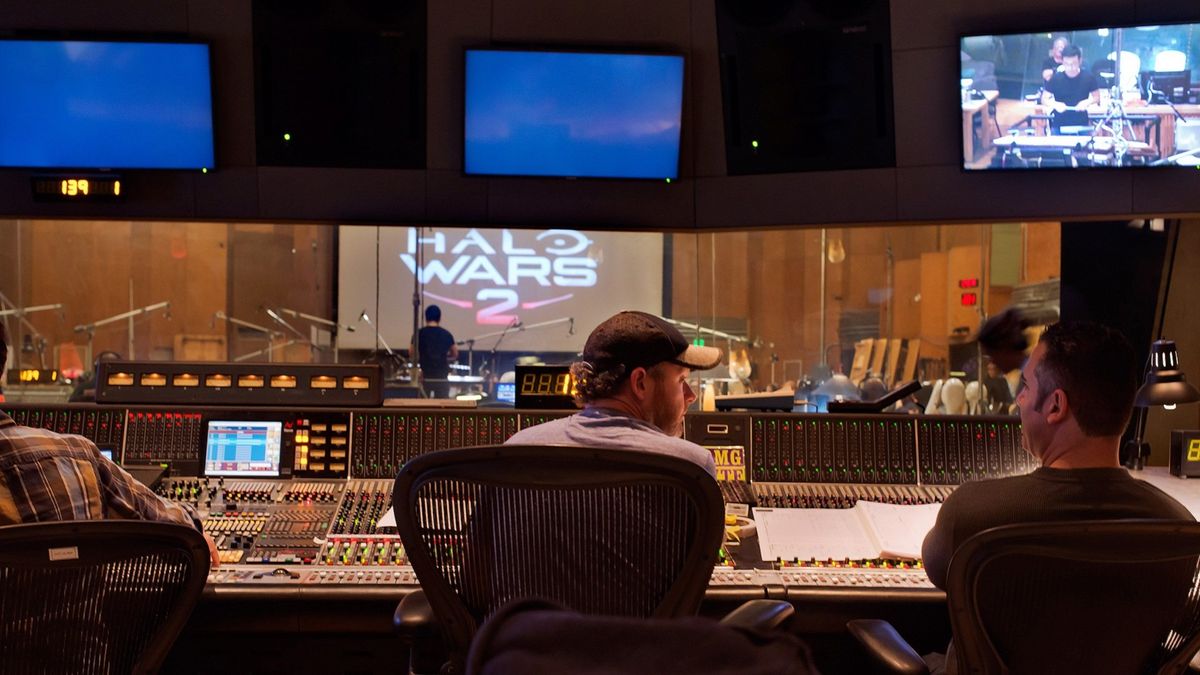
Gordy Haab teamed up with Finishing Move, comprised of Brian Lee White and Brian Trifon, to compose Halo Wars 2's soundtrack. Halo Wars 2's musical score is as majestic as it is dynamic. In Halo Wars 2, the music adapts to the flow of battle, ramping up as the action intensifies and subsiding as combat ends. The team composed a whopping 150 minutes of music, including the score for the mesmerizing Blur cinematic cutscenes.
In this in-depth interview, we discuss the team's origins, the experience of working with 343i and Creative Assembly on Halo, and much more.


Jez Corden: First of all, thanks for joining us. For those who may not be familiar with your work, could you introduce yourselves and give us a glimpse into your history working with the industry? I'd love to know how each of you got started on your journey with music.
Brian Trifon: I grew up as an aspiring heavy metal guitarist and metal purist, but ended up getting a degree in jazz guitar. Somehow that all led to a career as an electronic musician and musical sound designer, which circuitously led into composing for games. I worked as a session musician for several of the Assassin Creed games and have a long history with Halo starting with Halo Anniversary, Halo 2 Anniversary, Halo Channel up to Halo Wars 2.
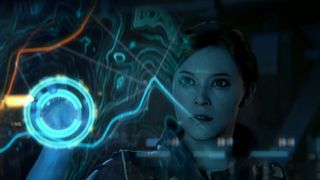
Brian Lee White: I worked in the family-owned music store when I was kid growing up in the '90s, stringing guitars and fixing dented band instruments for less than minimum wage. That's when I got into production and started using the back of the store as a recording studio to produce local bands and record my own crappy punk projects. After graduating college, and despite receiving a perfectly employable business degree, I decided I would go hang around recording studios and make records, again for less than minimum wage.
I linked up with Trifon about 10 years ago and we started working together on various projects, composing for ads, some TV placements, just your general bread and butter non-glamorous composer work. We envisioned the concept of Finishing Move in 2012, and the rest is history, I suppose. We've been working in the Halo franchise ever since.
Get the Windows Central Newsletter
All the latest news, reviews, and guides for Windows and Xbox diehards.
Gordy Haab: My love for games and music started pretty early on. I used to create my own video games when I was about six or seven years old using basic programming and an Atari 400. Around the same time, I saw ET. The music was so impactful that I formed a full blown obsession with music. Particularly music in films. And there ended my dream of making video games, and began my dream of composing music.
Fast forward many studious years, and I decided to move to Los Angeles to pursue a degree in scoring for films from the University of Southern California. While there, I became friends with another composer who went on to be a music director at LucasArts. I was talking to him about my interest in writing music for games, and he said they were working on an Indiana Jones game. I had just finished scoring a Star Wars fan film called Ryan vs. Dorkman II, which I used as my demo. I got the job and have been actively working in games ever since.
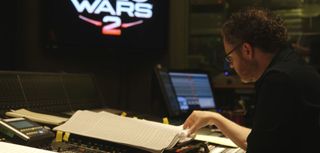
How did you all get involved with Halo Wars 2?
Trifon: White and I worked with the audio director of the project, Paul Lipson, on several past Halo projects. Collectively we talked with Paul and decided that this project really needed (in addition to us) someone who is a true orchestra wizard that can add a level of sophistication to the music that would add to and elevate the Halo music legacy. Gordy is that guy. He's a composer's composer and truly a master of his craft.
Halo's music is a signature part of the experience. The opening title theme from the original game, and the main action theme, are effectively burned into my mind. How much of Halo's legacy impacted your direction when creating the sound track for Halo Wars 2?
We create completely new themes, and compose music that's uniquely our style, and then weave in the threads that make up the fabric of the "Halo music sound."
Haab: Halo's iconic music was definitely a part of the inspiration for our score. Our music for HW2 certainly needed to live in the same world. But much like the game itself, we wanted to pay homage but also move the creative direction forward in a way that hopefully gives fans the "Halo feel" while introducing some completely new themes and musical approaches.
One case where we actively chose to use a specific theme is the "Spirit of Fire" theme from the original Halo Wars. Even here, we wanted to give it a new life by writing a fresh take on the theme, in our own style. An example of this is the opening track on the HW2 soundtrack, "Recommissioned." But for most of the score, rather than use existing themes verbatim, we create completely new themes, and compose music that's uniquely our style, and then weave in the threads that make up the fabric of the "Halo music sound." The results of which we hope is a fresh, textured, emotional and powerful score that organically fits right at home in the Halo universe.

Can you describe your processes for creating music for a video game, right from when the project has been greenlit? Is there a "standard" way to produce music for games, or do you each have your own unique methods?
Trifon: Every game is different and requires a different approach, but generally speaking music for games has an aspect of modularity to it, in that you have to think about layers of intensity and construct music that can ramp up in intensity as the action or danger increases and also ramp down to a more chill state, as well.
Lee White: Before any of the writing starts, most projects have a general style guide that we work out with the project's audio director, sort of a "here are the musical, stylistic, emotional pillars we want to capture." This can involve just general discussion on style or even get as granular as creating some playlists of stuff we are all liking, just to get a general vibe going. This way everyone is on the same page, so we aren't wasting time writing in a completely different direction. Unlike scoring to linear picture, with games you really have to think about not only the interactive aspects of the score, or how it ramps up in intensity or reacts to player feedback, but also how long the player is going to be listening to a specific piece or loop during that section of gameplay.
So in that regard you have to be careful of using too much overt melody in certain situations that may loop for hours of gameplay, as to not fatigue the player. Or you have to build the melody into the music in a modular way that can come in and out dynamically. Of course when you are working with a live recorded score, you don't always have infinite options for extracting different mixes or layers, so all these little details have to be taken into account when you are mapping out a piece.
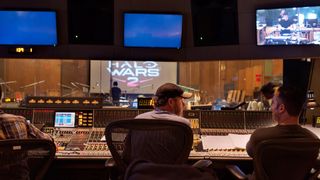
I would argue that Halo Wars 2's score is very character driven. What sorts of processes and inspirations do you draw upon when creating music to accentuate and introduce characters like Atriox and Isabel?
The inspiration for each character's theme was drawn from their individual stories.
Haab: All of our main characters have their own theme. If my film background taught me anything, it's that the most important thing is always "story." So the inspiration for each character's theme was drawn from their individual stories. For example, it would have been easy to just see Isabel as just A.I. But Isabel has a great story, full of complex emotions. She is introduced to us at a time of great turmoil and has to fill some pretty big shoes and deliver like a true hero. Anyone in a similar position would be both frightened and eager to please. So her theme needed to carry all of this emotional weight.
If you listen to "Isabel's Awakening" from the HW2 soundtrack, you'll hear the strongest example of this, appearing brave and stoic at first but almost immediately exposing its insecure underbelly. Then slowly growing in emotional complexity, from fear to sadness, and eventually confidence and bravery, as it reaches its heroic peak. Just like Isabel.
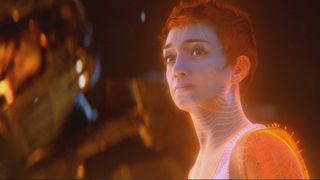
To what extent do you guys get involved with the game development side of things when it comes to music? For example, Halo Wars 2 has dynamic music, which ramps up and scales down in response to the ebb and flow of battle. Do you produce the score and send it off? Or are you directly involved with how the music works in relation to actual gameplay?
Lee White: On some game projects, we actually do the interactive implementation ourselves in a middleware system such as Wwise. So we would drive the interactivity based on a design document that we work on with the audio director and the design team, and then realize that design directly in Wwise, [and then] play test and tweak directly. In the case of Halo Wars 2, all the Wwise implementation was handled at Creative Assembly in the UK, so we worked closely with Sam Cooper (audio lead at CA) and Paul Lipson (vice president of creative services at Formosa Group) on the interactive design and came up with a way we would structure the cues and deliver the edits of music in a modular way they could plug into the game.
In highly interactive music systems, this process always requires iteration. In other words, you come up with an idea of how you think a certain level of interactivity would be cool, write the cues, extract the assets and plug it in to see if it works. Once you play test it, you might realize, "oh we need this extra level of intensity here" or "the player is spending way more time within this loop here, so let's make that segment twice as long."
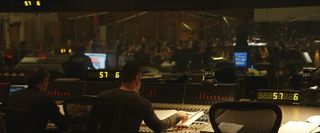
In what ways would you say Halo Wars 2's score differs from other Halo games? And how intentional was it to create something that is quite divergent?
Haab: The original Halo music is also thematic, of course. But we wanted to take that a step further by writing our score with an almost old fashioned, leitmotif approach. Every character has a theme, and these themes weave in and out of each other with great complexity. And although it does occasionally exist — dense, fast-paced and intricate action music has not always been at the forefront of Halo music — and we wanted to bring that in a bit more in order to add a heightened sense of excitement in key moments.
I wouldn't say our intention was to diverge from the existing sound, but we felt it was very important to allow ourselves to be "ourselves." This is so important for a composer coming into an existing franchise, where you have just two choices: imitate the existing music, or absorb what makes the existing music what it is, and then just be yourself. If we were to just imitate the existing Halo music, we'd be doing a disservice to the fans (because it would never actually "be" the original) and a disservice to ourselves (because it would never be "us"). So we chose to study the original but ultimately be ourselves. The risk is that fans may like one or the other more or less, but at the very least, we can say we've contributed our own heart and soul to the Halo universe.

For all the amateur musicians composing from their bedrooms or home offices, what is the best advice you would give them?
Trifon: I think having a distinctive musical voice and aesthetic is of supreme importance on the musical side of things. Figure out whatever it is you are best at with music and push it even further. Also you don't have to be an island; if you're weak at certain things, collaborate and work with people that are strong in those areas.
Lee White: Understand that just being a great composer or musician is not good enough. Large projects require a team effort and demand that you can be a great team member, which includes empathizing with where each different stakeholder is coming from on a project. It's not like an artist album where it's just your baby and your singular vision may be the only one that matters. It takes a village. Making games can be very stressful work, especially when it gets into crunch time, people want to work alongside peers that are fun to be around and can come together when the going gets tough. In short, be a solid friend and a good hang, in addition to being great at your craft and you will go far.
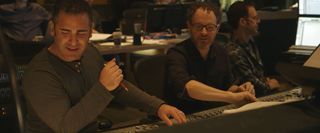
For fans of Halo Wars 2's music who might be interested in expanding their musical horizons, what is one piece of music, soundtrack, or artist, each of you would recommend?
Trifon: I would suggest listening to the music of Burial, it's nothing like the Halo Wars 2 soundtrack or really any game soundtrack. However, Burial is an artist with a truly distinctive aesthetic who understands how to be minimal, and when to be messy, and how to express deep emotions with texture, rhythm and melodic vocal fragments.
Lee White: Jóhann Jóhannsson's score for Arrival, or any score that guy does, just next level creativity in organic musical sound design.
Haab: Either of Samuel Barber's Essays for Orchestra. I guess that makes me old fashioned, but this music absolutely sets the highest bar possible for the combination of emotion and musical craftsmanship ... a line that is very difficult to balance.
What are your favorite video game soundtracks, either ones you worked on personally or from other artists?
Trifon: I think my favorite game soundtracks are from Metroid and Super Metroid.
Lee White: For scores we've done, I really liked how the score we did for Double Fine's Massive Chalice turned out, and of course Halo Wars 2! For all time, that would be Final Fantasy VI (or III as it was titled then in the U.S.) and Chrono Trigger on SNES. When I was 13, I actually made my mom buy me the imported soundtracks from Japan, I think from an ad in the back of a Nintendo Power issue.


Haab: Favorite score I've written?? My score for Star Wars Battlefront. Much like this score, I had to step into an existing franchise — a pretty iconic one at that. I'm very proud of that score mostly because of how I was able step into that musical world while still maintaining a strong voice of my own. From other composers, Final Fantasy III, hands down. So good.
A huge thanks to Brian Lee White, Brian Trifon, and Gordy Haab for joining us!
Halo Wars 2's soundtrack will go down as one of the franchise's greatest. It really elevates the experience as a whole, particularly so in the campaign, where character themes shine the brightest.
Halo Wars 2 is available now for Xbox One and Windows 10 as an Xbox Play Anywhere title, and it's really quite excellent.

Jez Corden is the Executive Editor at Windows Central, focusing primarily on all things Xbox and gaming. Jez is known for breaking exclusive news and analysis as relates to the Microsoft ecosystem while being powered by tea. Follow on Twitter (X) and Threads, and listen to his XB2 Podcast, all about, you guessed it, Xbox!